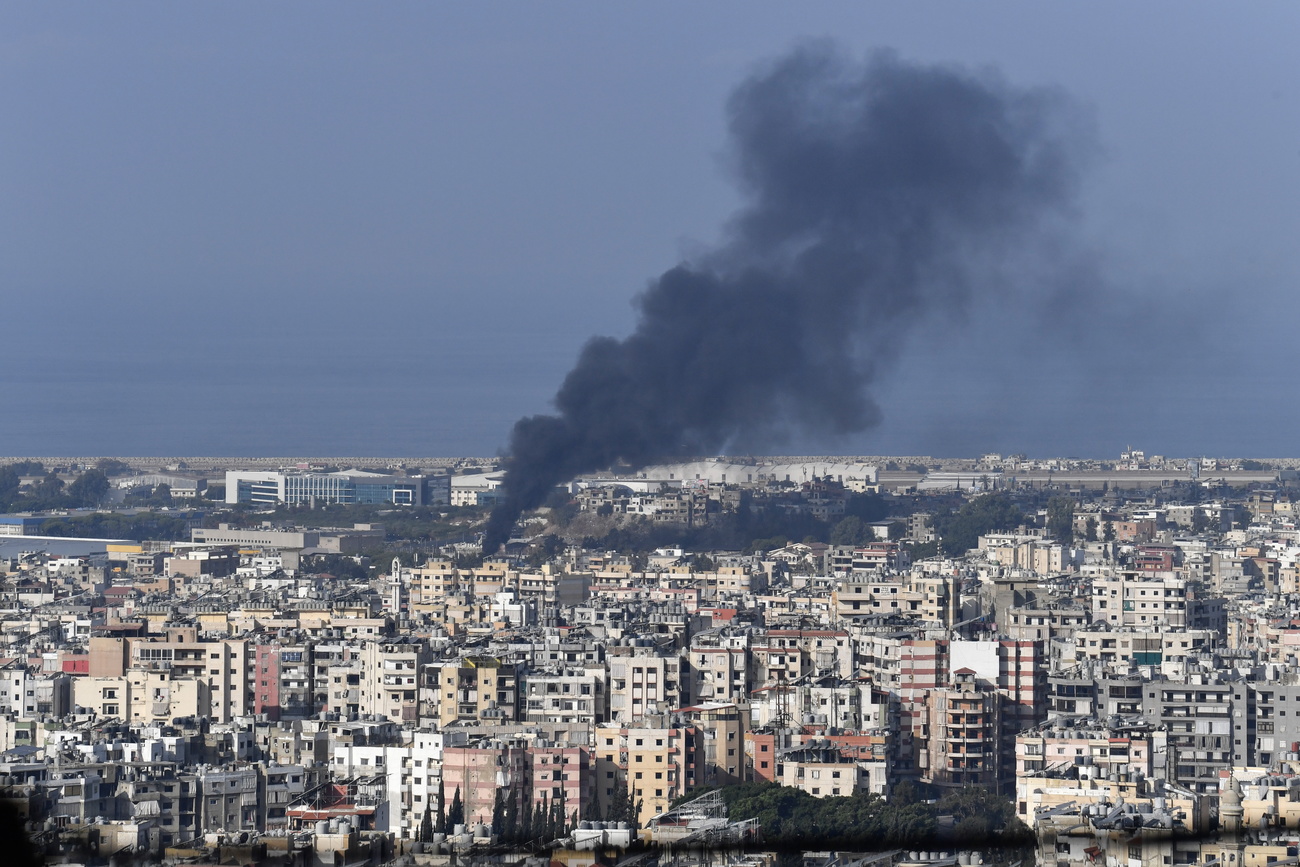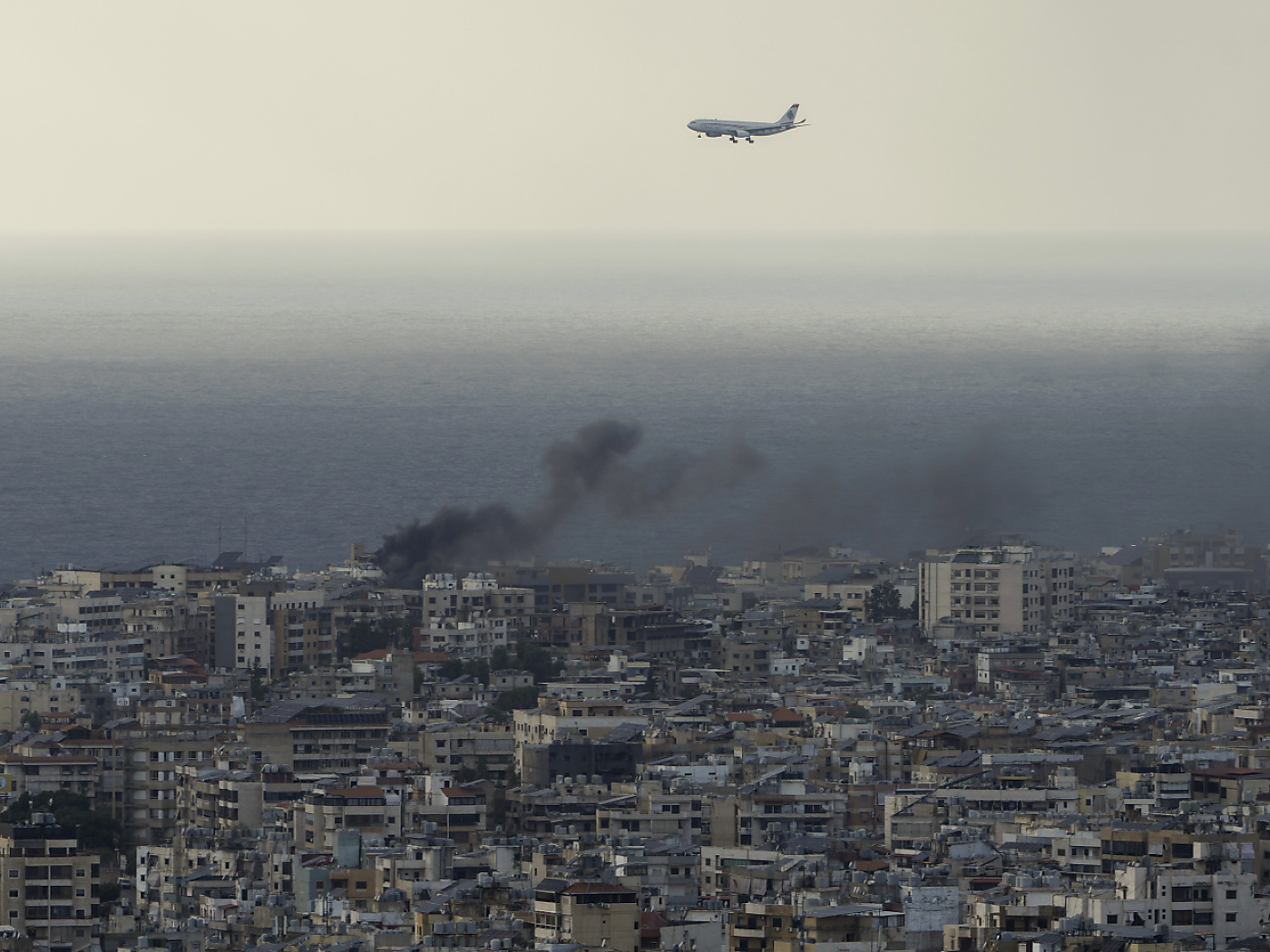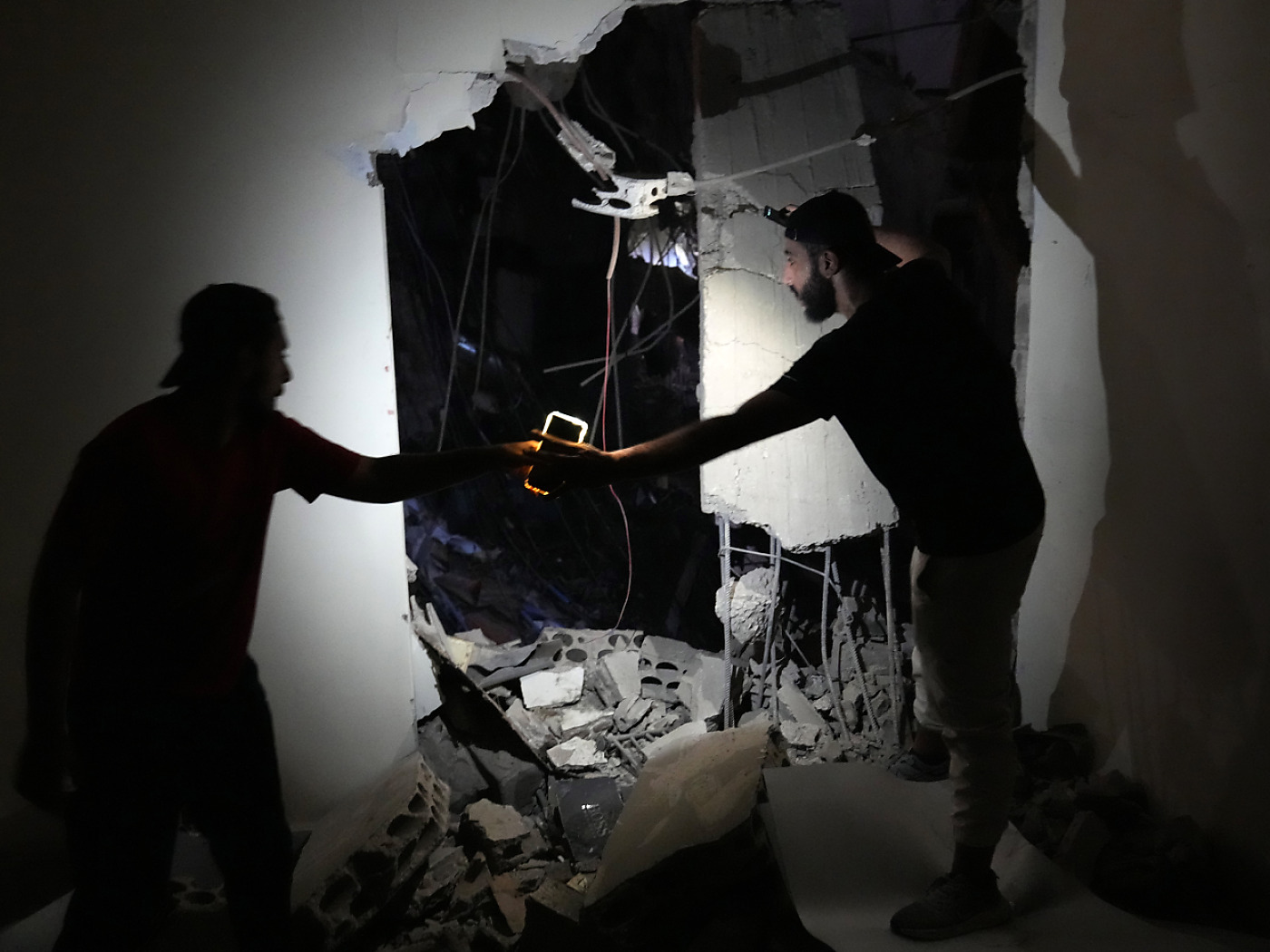Swiss expat describes the ‘total uncertainty’ of life in Lebanon

The situation in the Middle East remains extremely tense as Israel and the militant group Hezbollah continue fighting. A Swiss woman living in Lebanon describes what life has been like in a country under siege.
Since the Israeli-Hezbollah conflict escalated in late September, the country’s health ministry has reported over 2,500 casualties and more than 12,000 wounded. On Wednesday Israeli strikes hit the southern suburbs of the capital Beirut.
+ Get the most important news from Switzerland in your inbox
Meanwhile Hezbollah on Wednesday said it had launched a rocket attack against a military manufacturing company near Tel Aviv, although there was no immediate confirmation of a defence facility having been hit nor of any casualties, The Guardian reportedExternal link.
According to the UN refugee agency (UNHCR), around a quarter of Lebanon is under an Israeli evacuation order. Around a fifth of the country’s 5 million inhabitants have already been displaced, the UNHCR said.
Last week SWI swissinfo.ch spoke to Maha Weber, a Swiss national who retired early and has been living in Lebanon for six years, not far from Beirut.
SWI swissinfo.ch: What is the situation like in the village where you live?
Maha Weber: Fortunately, I live in a village that is a bit out of the way, around 20 kilometres north of Beirut. I hear the Israeli fighter jets every day.
I can see as far as Beirut. Sometimes in the evening I can see bombing over the capital from my window. It’s such a painful feeling. I think: how are civilians and families coping under these bombs?
SWI: How do you cope?
M.W.: Badly. That’s all I can say. The mixed feeling of powerlessness, injustice and arbitrariness is unbearable. Supporting refugees in nearby schools and phoning family, friends and acquaintances in Lebanon and Switzerland sometimes help to calm me down.

More
SWISS cancels flights to Beirut until January
SWI: Have any restrictions been introduced where you live since the Israeli attacks began?
M.W.: No, but security measures are being taken. I don’t move around much, and if I do, it’s towards the north. But I no longer travel to Beirut, even though most of the friends I have here live there.
SWI: What do these friends tell you? How are they coping?
M.W.: After a year of watching the Israeli army in Gaza, the Lebanese fear the worst for Lebanon.
I notice that some are extremely stressed. They have fits of either anger or anxiety. Others are very reserved and don’t talk about it at all. Most are helpless and many are wondering, ‘What are we going to do? What will happen to Lebanon?’ There is total uncertainty.
SWI: Do you also know people living in Israel?
M.W.: No, not at all.

More
Swiss parliamentary committee pushes to extend Hamas ban to include Hezbollah
SWI: Do you know any other Swiss people living in Lebanon and are you in contact with them?
M.W.: I know a few people, but we haven’t had any recent contact.
SWI: Has the Swiss embassy in Lebanon contacted you?
M.W.: Yes, several times by email, with the recommendation to leave Lebanon by your own means, at your own risk and at your own expense.
SWI: How do you keep up to date on the situation? Where do you get factual information from?
M.W.: From international and local media as well as social media. I check the news on the situation at least ten times a day.
“The risk of escalation has increased further. The development of the situation is uncertain and a significant deterioration in the security situation throughout the country is possible at any time,” the ministry writes on its websiteExternal link.
The ministry “recommends that Swiss nationals leave the country using their own means. The decision to leave the country is voluntary and at your own risk and expense. Therefore, use the commercial means of transport that are still available. Switzerland does not intend to carry out an organised departure for Swiss nationals.”
SWI: A group of 400 Lebanese nationals living in Switzerland has appealed to the government demanding that Switzerland fulfills its role as international arbiter in Lebanon by ensuring compliance with international humanitarian law. What do they expect from Switzerland?
M.W.: I don’t know what’s going on behind the diplomatic scenes, but I think that Switzerland, as a signatory to, and the depository state of, the Geneva Conventions, should be more proactive in this Middle East conflict and not just limit itself to declarations.
SWI: Israel is fighting Hezbollah, which operates from Lebanon. How is this militia’s role perceived in the country?
M.W.: Lebanon is divided on the issue of Hezbollah. But given the scale of the bombing and the number of civilian casualties and villages destroyed by Israel, there has been a huge wave of solidarity with the civilian refugees who have had to leave their homes in a hurry, sometimes even in their pyjamas.
This is not just about Hezbollah if you look at the plans and statements made by [Israeli Prime Minister Benjamin] Netanyahu and the members of his far-right government. Among other things, they are threatening Lebanon with ‘destruction like in Gaza’.
This is a humanitarian catastrophe – a considerable part of the Lebanese population has had to flee.
But Lebanon itself has no money and is dependent on international aid. There are a lot of private initiatives, at least so far. That’s great.
SWI: As you say, the economic and political situation in Lebanon is very tense. Do you see a future for yourself in this country?
M.W.: I am torn. What worries me, and I have to emphasise this, is that Israel only bombs the places where Shiites live. I wonder whether this a strategy to create fertile ground for a sectarian conflict.
Both the population hosting refugees and those who had to flee are suffering the consequences of a severe financial and economic crisis caused by the corruption and mismanagement of the political elite, which has impoverished the population. The ingredients for potential future problems are there.
My plans are up in the air. The only thing I am currently holding on to is my plan to travel to my other home country, Switzerland, next month – to feel safe, surrounded by my family and friends. I’m looking forward to the departure date, but at the same time I’m afraid Israel might bomb the Beirut airport.
Edited by Balz Rigendinger and Samuel Jaberg. Adapted from German by Catherine Hickley/gw

More
Newsletters

In compliance with the JTI standards
More: SWI swissinfo.ch certified by the Journalism Trust Initiative









You can find an overview of ongoing debates with our journalists here . Please join us!
If you want to start a conversation about a topic raised in this article or want to report factual errors, email us at english@swissinfo.ch.